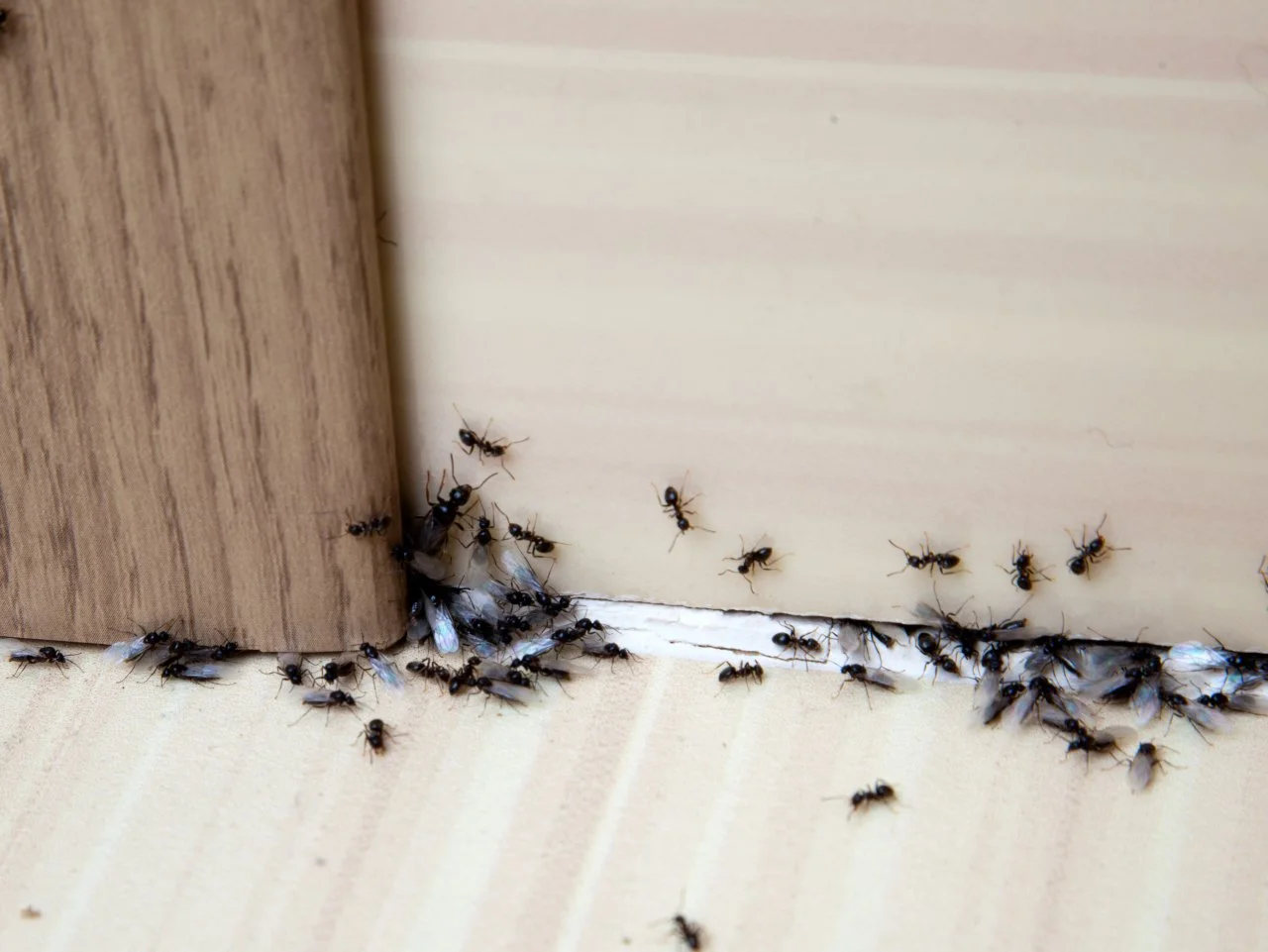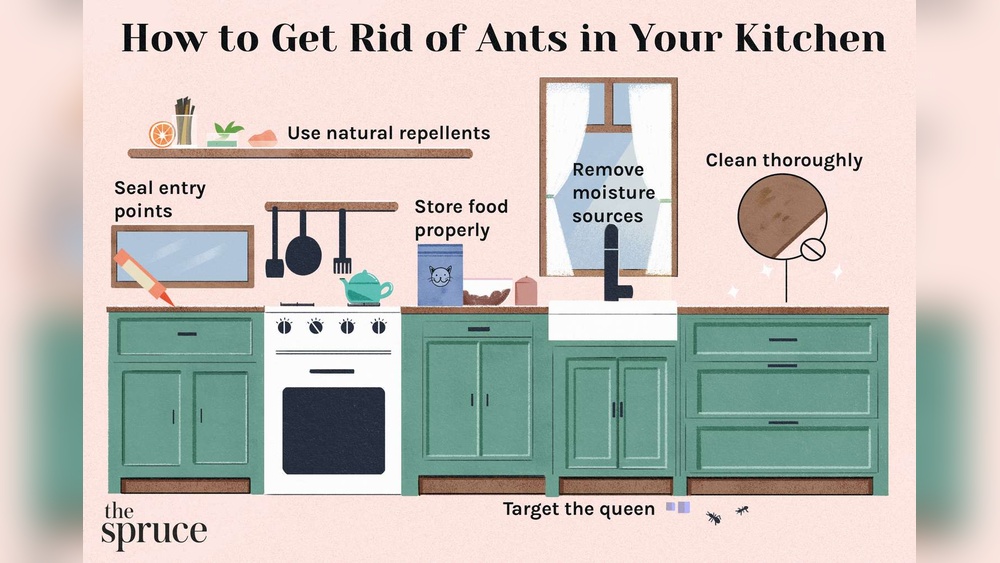Are tiny ants invading your kitchen, crawling across your counters and sneaking into your food? You’re not alone—and it can be incredibly frustrating.
These small ants may seem harmless at first, but if you don’t act quickly, they can multiply and become a big problem. The good news? You don’t need harsh chemicals or expensive pest control services to get rid of them.
You’ll discover simple, effective ways to eliminate those pesky ants from your kitchen for good. Keep reading to take back control of your space and enjoy a clean, ant-free kitchen once again.
Identify Ant Types
Common kitchen ants include tiny black ants, sugar ants, and odorous house ants. These ants are often drawn to sweet, greasy, or protein-rich food crumbs left on counters or floors. They enter kitchens searching for food and water.
Behavior patterns show these ants travel in lines, following scent trails left by scout ants. They can enter through small cracks or gaps near windows, doors, or pipes. Ants are most active during the day but can also appear at night.
| Ant Type | Size | Food Preference | Common Entry Points |
|---|---|---|---|
| Tiny Black Ants | 1/16 inch | Sweets, grease | Cracks in walls, gaps near windows |
| Sugar Ants | 1/8 inch | Sugar, syrup, honey | Doors, window frames |
| Odorous House Ants | 1/16 inch | Sweets, protein | Foundation cracks, plumbing areas |

Locate Ant Trails
Ants follow trails marked by a scent. These trails lead to their entry points in your kitchen. Check around windows, doors, and cracks in walls. Look for tiny holes or gaps where ants can come inside. Wipe these areas clean to remove the scent trails.
Finding the nest is important to stop ants for good. Search near warm and moist places like under sinks or behind appliances. You may see many ants going in and out of one spot. This is likely their nest. Treating this area helps control the whole colony.
Clean Kitchen Thoroughly
Remove all food crumbs and spills from counters and floors immediately. Ants are attracted to even tiny bits of food. Wipe surfaces with a damp cloth and mild soap daily. Store food in sealed containers to block ant access. Check pet food bowls and clean up any leftovers. Empty trash bins regularly and keep lids closed tight. Clean under appliances and furniture where crumbs can hide. Sweeping and mopping help remove sticky residues that attract ants. These steps cut off the ants’ food supply and stop them from coming back.

Use Natural Repellents
Vinegar solutions work well to keep ants away. Mix equal parts of white vinegar and water in a spray bottle. Spray this solution around entry points, countertops, and cupboards. The strong smell disrupts the ants’ scent trails.
Essential oils also help repel ants naturally. Oils like tea tree, eucalyptus, and clove can be mixed with water. Spray this mixture in areas where ants appear. The oils’ strong scent confuses ants and keeps them out.
Peppermint and lemon are two natural options that ants dislike. Use peppermint oil or crushed peppermint leaves near kitchen entrances. Lemon juice or lemon peels can be placed on countertops or window sills. These scents act as natural barriers to ants.
Diy Ant Baits
Borax and sugar mixture is a simple and effective DIY ant bait. Mix 1 part borax with 3 parts sugar. The sugar attracts the ants, and borax kills them. Place small amounts on pieces of cardboard or in shallow containers near ant trails. Avoid placing where children or pets can reach.
Commercial homemade options include ready-made ant baits with similar ingredients. These products are easy to use and often come in bait stations. Ants carry the poison back to their colony, which helps reduce the entire nest. Always follow package instructions carefully for safe and effective use.
Seal Entry Points
Caulking cracks around walls, cabinets, and baseboards stops ants from entering. Use silicone or acrylic caulk to fill small holes and gaps. This method blocks tiny paths ants use to get inside.
Securing doors and windows is key to keeping ants out. Check for gaps under doors and around window frames. Use weatherstripping or door sweeps to seal these openings tightly. Make sure windows close firmly without spaces.
Sealing all entry points creates a strong barrier. Ants find it harder to reach food or water inside the kitchen. This step works well with cleaning and baiting to reduce ant problems quickly.
Maintain Kitchen Hygiene
Keep your kitchen clean every day. Wipe all counters and floors to remove crumbs. Clean spills immediately to stop ants from finding food.
Use a broom or vacuum to get rid of tiny food bits. Empty trash cans often and use bins with lids. This helps stop ants from smelling food inside.
Store food in sealed containers. Use jars or plastic boxes with tight lids. Keep sugar, flour, and snacks safe from ants.
Do not leave pet food out all night. Store it in a closed container when not in use. This reduces places for ants to feed.
| Cleaning Task | Why It Matters |
|---|---|
| Wipe counters & floors | Removes crumbs and spills |
| Empty trash regularly | Stops ants from smelling food |
| Seal food in containers | Keeps food safe from ants |
| Store pet food properly | Reduces ant feeding spots |
:max_bytes(150000):strip_icc()/TheSpruce_Howtogetridofandpreventodoroushouseants_colorv1-d55f1b3ffb8f44e1a34ba6d0a07bd4a0.png)
When To Call Exterminators
Signs of a large infestation include seeing many ants around food or water sources. Ant trails appear on walls, floors, and cabinets. You may find small holes or nests inside kitchen walls or under appliances. Food gets contaminated quickly, and ant activity is visible day and night. If ants come back after cleaning and baiting, the problem is likely big.
Professional treatment options use strong insecticides that are safe for homes. Exterminators find and destroy the nest, stopping ants from returning. They use sprays, dusts, or gels in hidden places. Treatments target the queen to stop reproduction. Professionals can also give advice on how to keep ants away long term. This service saves time and frustration when infestations grow too large.
Frequently Asked Questions
How Long Will Vinegar Keep Ants Away?
Vinegar keeps ants away only while its strong scent lasts, usually a few hours. Reapply frequently for continued effect.
What Is The Best Homemade Ant Killer For The Kitchen?
The best homemade ant killer mixes equal parts vinegar and water with a teaspoon of sugar. Spray it on ant trails.
What Causes Tiny Ants In The Kitchen At Night?
Tiny ants appear in kitchens at night due to leftover food crumbs, sugar spills, and accessible water. They seek sweet, greasy, and protein-rich sources to feed their colony.
How Do Small Ants Enter My Kitchen?
Small ants enter through tiny cracks, gaps, and open doors searching for food and water.
Conclusion
Small ants in the kitchen can be a persistent problem. Keep your kitchen clean and dry to stop ants from coming. Use natural solutions like vinegar, lemon, or peppermint oil to repel them. Seal cracks and store food tightly to block their entry.
Regularly clean spills and crumbs to remove their food sources. With patience and simple steps, you can control and prevent ants effectively. Stay consistent and your kitchen will stay ant-free.

Yes, working as , Food Blogger and Product Reviewer for last 6 years. Here you will get amazing deals for Smart kitchen products. I am your best source for the latest update in cooking trends. I provide insightful articles, reviews, and analysis on cutting-edge kitchen gadget. My mission is to empower readers with the knowledge they need to stay ahead in a rapidly evolving coking world. Join me as we explore the future of food technology and how it shapes our lives today and tomorrow.





